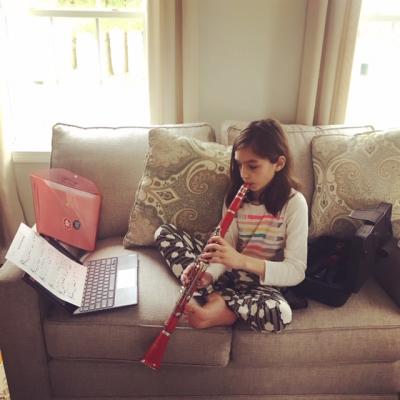Teachers log on for remote learning
On March 24, students showed up to class -- in their living rooms, bedrooms, and at kitchen tables across town. Until at least May 4, students will be learning remotely as schools are closed to help mitigate the spread of coronavirus.
“The feedback that I’ve been hearing from teachers and the paraprofessionals is that it's been going very well,” said Superintendent Dr. Kim Shaver-Hood. “We miss our students and we miss the face to face teaching time, but we’re making connections, reaching out, and everyone’s incredibly busy.”
All students from second to twelfth grade have a school-issued chrome book at home, and teachers are assigning work and interacting with students largely through Google Classrooms. Wareham students and teachers, especially in the older grades, have a bit of an advantage because they have been using Google Classrooms for several years and it isn’t totally new. The platform is flexible, and allows teachers to assign work, teach lessons, interact with students, insert links, and connect students to online educational resources like Khan Academy and Lexia.
For students without internet access, teachers are putting together paper packets.
Bonnie Lasorsa, a math teacher and department chair at the Middle School, said that she had an advantage in some ways because her students already learn from an online textbook. She is trying to stick to a normal routine: Just like in school, each lesson starts with a challenge problem that could be a review of old material, a logic puzzle, or a preview of the work to come.
Lasorsa is also taking advantage of remote learning to get her students thinking about math in a new way by asking them to keep a journal about how they use math in their day-to-day life.
“Some of them have already done a lot of cooking, and I have almost a full page on how math works in [tabletop fantasy game] Dungeons and Dragons,” Lasorsa said.
Students will get to review material with a game day once a week.
Lasorsa’s advice for parents: Don’t stress about schoolwork.
“No matter when we go back, as teachers, we’re going to meet the kids where they are. It’s not worth the fight. Don’t stress about it. Stay in touch with teachers if you have questions or concerns. That’s our job, to meet them where they are, and we do it all the time anyway,” Lasorsa said.
Lisa Breese, a sixth grade English teacher, is working to make remote learning fun. She has implemented an online badge system, so for each task students complete, they get a badge for their profile. She is also having the students compete to see who can earn the most badges.
Breese is also using an online platform called “FlipGrid” to have students answer questions through video. Students recently read a play, and analyzed the text. They also had a discussion about what makes a good friend, and whether characters in the play were good friends. Then, they took to FlipGrid to film a video of themselves introducing the class to a friend. Breese filmed an example introducing her dog.
Breese encourages parents to talk to students about their work and learn how to use the parent/guardian access to Google Classroom.
Russ Hart, the music teacher at Minot Forest Elementary School, said the transition to remote learning has been “a steep learning curve, and a sudden one at that.”
“Nothing beats the human interaction,” Hart said. “Nothing beats that eye contact, especially for the younger students.”
Being physically distant is especially difficult for the study of music, Hart said.
“Music is a group project. It’s a universal language and there’s a communal nature of it that’s really hard to do by yourself. By virtue of being a musician, you want to go and play with someone else,” Hart said.
As a workaround, Hart has been posting recordings of himself playing music for the kids to play along to, which he is calling the “Jam Along with Mr. Hart” series.
He encouraged families to invite their students to perform for them, saying that “in the home environment, [students] can be even a little more flamboyant than they would be in a situation where they would be a little more intimidated. Everyone lets their hair down a little bit at home.”
Overall, he said, the most important thing is that students keep up the momentum and practice.
After all, as Mariana Pereira, the mother of clarinet student Khloé Pereira, said, “The band must go on.”












